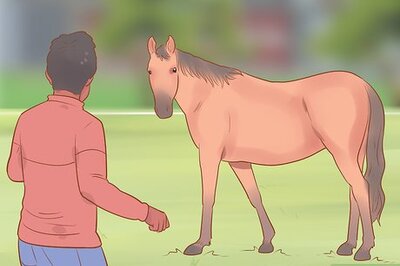
views
Definition of Mamacita
The word "mamacita" literally means "little mother." It's considered a term of endearment—and like most other terms of endearment, it's not meant to be taken literally. The closest phrase in English might be "hot mama"—it's a term used for a physically attractive young woman. People use this word to refer to people and also to describe people. For example, you might describe your girlfriend as a "mamacita bonita," which would mean you were telling people she is a beautiful, sexy Latin woman. The word "mamacita" has been used since at least the 1800s and figures prominently in popular culture. Music artists such as the Black Eyed Peas and Travis Scott have recorded songs called "Mamacita." When people use "mamacita" to describe someone, they're usually trying to conjure up a specific stereotype of Latin women that has racist overtones. Technically, you might consider this word a diminutive of a diminutive, since "mama" is already a sort of diminutive. But it's worth noting that this isn't a word you'd use to refer to your own mother.
Is "mamacita" offensive?
Many women find the word "mamacita" sexist. "Mamacita" is associated with catcalling and the objectification of women. This association alone puts a sour taste in a lot of women's mouths. Even others might connect the word with trauma they've experienced. At the same time, there are other women who are proudly reclaiming the word. You can find restaurants, blogs, boutiques, and even books with "mamacita" as part of the branding. Many other women consider the word okay depending on the context and the person using it. For example, a woman might be fine with her female friend calling her "mamacita" but not the male clerk at the grocery store.
Some people might consider "mamacita" racist. The word "mamacita" is strongly tied to the racist stereotype of Latin women as promiscuous and hot-tempered. When you refer to a woman as "mamacita," she might believe that you assume she embodies that stereotype because of her race. It's more likely that people will think you're being racist if you're white and call a Latin woman "mamacita." "Mamacita" is often considered more racist when it's used to describe someone than when it's used as a term of endearment to address someone because it's hard to use it as a description without invoking racist stereotypes.
Using "Mamacita"
Say "mamacita" to your girlfriend as a term of endearment. Most people consider "mamacita" to be a term of endearment that's perfectly appropriate if you're using it with your romantic partner. At the same time, it's often considered too familiar to use with people you don't know very well, and some women just don't like it at all. Talk to your romantic partner about the terms of endearment they like (or don't like) before you start using one. That's a good way to avoid offending them when you're trying to be sweet. You might compare this to an English term of endearment such as "baby girl." While it might be okay to call your girlfriend that (if she's okay with it, of course), you wouldn't call a cashier that.
If you are a woman, you might call your friends "mamacita." Women of Mexican or Latin American background, or who live in Spanish-speaking areas, might call their friends "mamacita," similarly to how women might call their friends "girlfriend" in English. Women sometimes also refer to other women around the same age as "mamacita," even if they don't know each other very well. This is particularly prevalent in Spanish-speaking areas.
Other Spanish Terms of Endearment
Amor As the Spanish word for "love," this is a go-to term of endearment that pretty much anybody is going to be okay with. You might also say "mi amor" (my love) if you want to be a little more personal. People use "amor" in Spanish the same way people use "love" or "my love" to refer to their romantic partner in English.
Bebé Many people consider "baby" to be a sweet term of endearment in English, so it should come as no surprise that its Spanish counterpart is also a popular way to refer to the person that you love. While in many countries this isn't as popular as "baby" is in American English, it's more popular among people who live in or close to the United States. In many Spanish-speaking countries, it's also just as common to call your significant other "baby" as it is to use the Spanish word. You can also just go with "bae," which has crossed over from English into a lot of other languages.
Cariño This word means something like "affection" in Spanish. When used as a term of endearment, though, it means something more like "dear," or "darling" would in English. Essentially, you're saying that the person is very precious to you and very loved. You could also combine "cariño" with "mi" and say, "mi cariño," meaning the same thing as "my dear," or "my darling."
Corazón This word means "heart" in Spanish. When you're using it as a term of endearment, though, it has a meaning similar to "sweetheart" in English. You can also say "mi corazón," which means "my heart," or "my sweetheart."
Mami "Mami" means the same (and is basically pronounced the same) as "mommy" in English, but is typically used to refer to a romantic partner. Male romantic partners are similarly referred to as "papi" (pronounced like "poppy"). "Mami" is a word that can have some of the same sexist and racist implications that mamacita does, so keep that in mind. If your female partner doesn't like "mamacita," she probably won't like "mami" either.
Princesa If you adore your female partner, the Spanish word for "princess" is a great way to show that. You might also try "princesita," a diminutive form of "princesa" that's a lot similar to "mamacita." "Princesita" also has the same ending sound and the same number of syllables, so if you're looking for something that sounds like "mamacita," this might be your best bet.




















Comments
0 comment